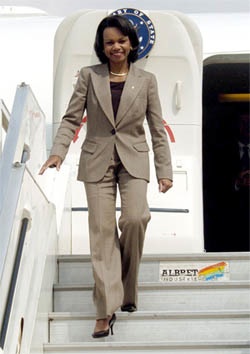Terrorists Recruited on YouTube?
Submitted by Judith Siers-Poisson on
Senator Joe Lieberman has penned a letter to Google, asking them to ban content on YouTube that is produced by organizations considered to be terrorist, such as Al Qaeda.

Submitted by Judith Siers-Poisson on
Senator Joe Lieberman has penned a letter to Google, asking them to ban content on YouTube that is produced by organizations considered to be terrorist, such as Al Qaeda.

"I tell my students that policy-making is 90 percent blocking and tackling and 10 percent intellectual."--Secretary of State Condoleezza Rice, cited in Mary Beth Brown, Condi: The Life of a Steel Magnolia (Nashville, Tennessee: Thomas Nelson, Inc, 2007), p. 180.
"When you never accomplish anything, your weekly summary of what you've done all week is just a bunch of 'accondishments' -- how you've filled the days."--Noah, a reader of "Princess Sparkle Pony's Photo Blog: I keep track of Condoleezza's hairdo so you don't have to" (May 5, 2008).
Notwithstanding the low poll numbers of the president she serves, US Secretary of State Condoleezza Rice is one of the few people within the Bush administration who has managed to remain relatively unscathed by the public and by pundits. Unlike some in the president's entourage who have left Washington due to criticisms of their performance or ethics, Rice's current standing at home is sufficiently adequate from a PR perspective to allow her (up to now) to stay on in her job without too many embarrassments. True, there have been calls to remove her from her current position because of her recently disclosed role in the administration's use of torture. And doubts about Rice's qualifications as Bush's foreign-policy guru have existed for years, with, for example, her former National Security Council boss in the administration of George H.W. Bush, Brent Scowcroft, stating in 2005 that her "expertise is in the former Soviet Union and Europe. Less on the Middle East." More recently, an article by Patrick Seale, a British writer on the Middle East, talks about "The Tragic Futility of Condoleezza Rice."
But Condi, rising as she has from her solidly middle-class origins in Birmingham, Alabama to the highest echelons of the US government, remains a subject of admiration. Earlier this year the Harris Poll reported that Rice was "still the 'shining star' of the administration." A 2006 profile by BBC News gushed that "Rice's intellectual brilliance is undisputed," and she "has consistently been one of the most popular members of the Bush administration." Pundits have repeatedly floated her name as a possible Republican vice presidential running mate for John McCain. "For a party that up to now has been clueless about how to run against either a woman or a person of color, Condoleezza Rice is pure political gold," explained Nicholas Von Hoffman in a commentary for CBS News.
In fact, Rice's genius and foreign-policy expertise are more image than substance, as recent biographies by Elisabeth Bumiller and Marcus Mabry suggest. In her ascendance to power, Rice's main instrument has not been ground-breaking thinking about important international issues, but rather what Mabry characterizes as "her phenomenal skill at spinning."
Submitted by Bob Burton on
Charlie Black, the chief campaign adviser for Republican Party Presidential aspirant John McCain, has dismissed calls that he should resign due to his many years of lobbying work for BKSH & Associates, calling the calls "complete inside-the-beltway nonsense." MoveOn
Submitted by Judith Siers-Poisson on
 As CMD has reported previously, the infant formula industry in the U.S. is committed to making sure that women aren't, as they put it, made to feel guilty about not breast feeding. But it seems that formula producers are also looking to make inroads in Europe, where rates of breast feeding are far higher than in the U.S.
As CMD has reported previously, the infant formula industry in the U.S. is committed to making sure that women aren't, as they put it, made to feel guilty about not breast feeding. But it seems that formula producers are also looking to make inroads in Europe, where rates of breast feeding are far higher than in the U.S.
Submitted by Bob Burton on
Doug Goodyear, the CEO of the Washington D.C. PR and lobbyshop, DCI Group, was selected to manage the forthcoming Republican National Convention (RNC), in St.
Submitted by Bob Burton on
The Colombian government -- which is dogged by controversy over its human rights record -- is seeking help from British PR firms to help promote a "modern" image amongst journalists and politicians. Colombia's deputy head of mission in the UK, Andelfo Garcia, told PR Week that "the stereotype of Colombia is not right. We are a growing country with a good story to tell.
Submitted by Judith Siers-Poisson on
 The global increase in grain prices may make the meat supply less safe. The European Union is considering a relaxation of feed bans that prohibit animal by-products being used as feed for other animals in the human food chain.
The global increase in grain prices may make the meat supply less safe. The European Union is considering a relaxation of feed bans that prohibit animal by-products being used as feed for other animals in the human food chain.
Submitted by Judith Siers-Poisson on

The Pentagon launched its covert media analyst program in 2002, to sell the Iraq war. Later, it was used to sell an image of progress in Afghanistan, whitewash the U.S. detention center at Guantanamo Bay, and defend the Bush administration's warrantless wiretapping, as David Barstow reported in his New York Times expose.
 But the pundits weren't just selling government talking points. As Robert Bevelacqua, William Cowan and Carlton Sherwood enjoyed high-level Pentagon access through the analyst program, their WVC3 Group sought "contracts worth tens of millions to supply body armor and counterintelligence services in Iraq," reported Barstow. Cowan admitted to "push[ing] hard" on a WVC3 contract, during a Pentagon-funded trip to Iraq.
But the pundits weren't just selling government talking points. As Robert Bevelacqua, William Cowan and Carlton Sherwood enjoyed high-level Pentagon access through the analyst program, their WVC3 Group sought "contracts worth tens of millions to supply body armor and counterintelligence services in Iraq," reported Barstow. Cowan admitted to "push[ing] hard" on a WVC3 contract, during a Pentagon-funded trip to Iraq.
Then there's Pentagon pundit Robert H. Scales Jr. The military firm he co-founded in 2003, Colgen, has an interesting range of clients, from the Central Intelligence Agency and U.S. Special Operations Command, to Pfizer and Syracuse University, to Fox News and National Public Radio.
Of the 27 Pentagon pundits named publicly to date, six are registered as federal lobbyists. That's in addition to the less formal -- and less transparent -- boardroom to war-room influence peddling described above. (There are "more than 75 retired officers" who took part in the Pentagon program overall, according to Barstow.)
The Pentagon pundits' lobbying disclosure forms help chart what can only be called a military-industrial-media complex. They also make clear that war is very good for at least some kinds of business.
Submitted by Diane Farsetta on
As part of its plan to expand online "information operations," the Pentagon is launching "a global network of foreign-language news websites ... and hiring local journalists to write current events stories and other content that promote U.S. interests," reports Peter Eisler. The Pentagon launched Matawani.com last year, an Arabic-language site with Iraq news; other sites are being developed for Asian and Latin American audiences.
Center for Media and Democracy (CMD)
520 University Ave, Ste 305 • Madison, WI 53703 • (608) 260-9713
CMD is a 501(c)(3) tax-exempt non-profit.
© 1993-2025